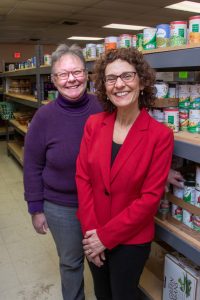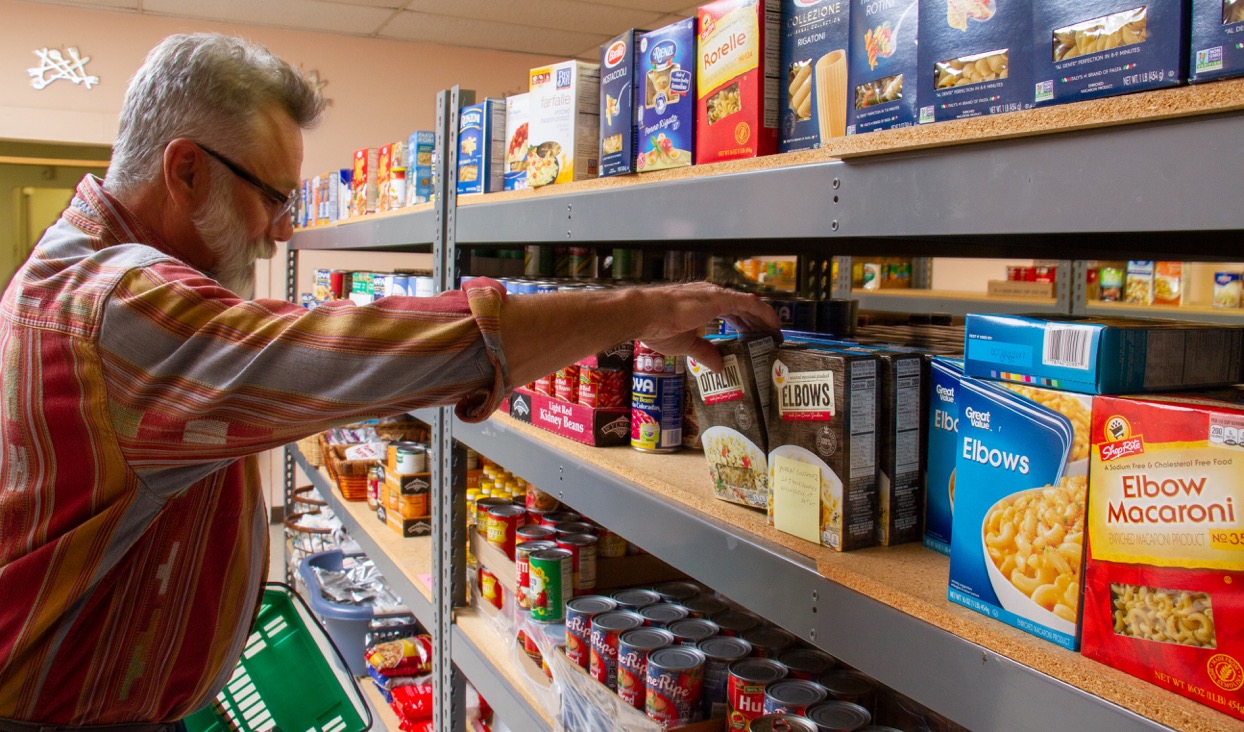Tucked behind a popular diner along a high-traffic stretch of Whalley Avenue, Jewish Family Service of Greater New Haven’s headquarters likely goes unnoticed by many who drive by it. But make no mistake: from this unassuming home base emanates a far-reaching and meaningful impact.

In 2018 alone, JFSGNH distributed more than 100,000 pounds of food at its food pantry, served more than 300 households with its Social Work Outreach Services program, provided care for 25 adolescents through its therapeutic foster care program, and helped provide food to 354 students through the Food4Kids program it administers with the Women’s Philanthropy division of the Jewish Federation of Greater New Haven.
“We have a myriad of programs, and there’s a lot of interface between them,” says Amy Rashba, who became CEO of the organization in November. JFSGNH has programs to help people in all stages of life, from children to the elderly, she adds. “We really help people through their lifetime.”
Many mistakenly presume the organization is geared solely to Jewish people, but JFSGNH will help people of all faiths and backgrounds – anyone who needs assistance and can benefit from its growing roster of services: foster care and adoption services, emergency food and utility assistance, counseling and family support, services for domestic violence victims, and emergency and caregiver services for Holocaust survivors, just to name a few. 
Feeding the Need
One of the most visible aspects of the organization is its food pantry at 1440 Whalley Ave. (on the ground floor, beneath its headquarters) to meet emergency and long-term needs of individuals and families.
“We serve anybody without question” who is hunger-insecure, meaning they can’t provide three meals a day for themselves or their family, says Sandra Hagan, food pantry director and coordinator of agency operations.
About 90 percent of the pantry’s clients are on the Supplemental Nutrition Assistance Program (SNAP), formerly known as food stamps. The pantry serves people from throughout Greater New Haven but most clients are from the Westville area of New Haven, Hagan says.
Adults over the age of 60 are the most common among clients, she says, and many of those are Russian Jews who emigrated and settled here in the 1980s. But demand for food at the pantry is rising across the board, Hagan says.
“The need is constantly going up. If the need wasn’t there, there wouldn’t be so many pantries in Greater New Haven,” says Hagan, adding an average of 250 families visit the JFSGNH pantry monthly.

In January, Hagan heard from concerned clients who worried how the longest federal government shutdown in history would impact their SNAP benefits. Demand for food rose as people depleted their SNAP benefits and realized they were short on funds. Though that shutdown ended Jan. 25, the threat of a future one lingers.
Clients must apply to access the pantry and visit by appointment only, though emergency walk-ins are accepted, says Hagan. While there, many clients learn about and connect with other JFSGNH services, such as utility assistance or social work, she adds.
The pantry is open Wednesdays from 9 a.m. to noon and Thursdays from 9 a.m. to noon and 1 to 3 p.m. JFSGNH added the Thursday afternoon hours in February to meet growing demand. Most clients are referred to the pantry from 2-1-1, the free info-line run by United Way of Connecticut and the state. Most of the food that lines the shelves comes from the Connecticut Food Bank, at reduced prices or for free, while the rest comes from community donations.
“On any given day we go through 900 to 1,500 pounds of food,” Hagan says, noting that’s just non-perishables and doesn’t include meats, fruit and vegetables that clients also can get. 
Fostering Stability
Another JFSGNH service that sees continued increases in demand is the therapeutic foster care program, which places children – mostly teens who have been removed from their birth families – with foster families to provide not only a stable living environment, but also a range of therapeutic services.
“We’re in dire need of foster families,” says Rashba, adding many in the community aren’t aware of the need.
“We really need families desperately.”
Fostering a child is rewarding, but can be challenging, says Elaine Benevides, JFSGNH’s team leader for therapeutic foster care. Many of the youths seeking placement have been removed from their homes by the state Department of Children and Families (DCF) due to neglect or abuse and suffer the effects of trauma, she says.
“A lot of these kids have bounced around the system so much it becomes confusing for them,” she says, and many develop trust issues or have difficulty learning and abiding by household rules. “Our major goal is to keep kids in the homes that we place them in.”
The program’s goal is to keep youths in a good home until they “age out” of the foster care system, Benevides says.
“A lot of time, I think the system takes the easy way out,” she says, adding that if a foster parent complains about a child, the state typically will move the child from that home and into another one. JFSGNH’s approach is different, she says. “We go out there and we work with the family and [the child], and work through the issue to keep [the child] there.”
Cases are referred to Benevides by DCF, and she doesn’t have enough families to meet the need.

“I get multiple referrals every day from across the state,” she says. “A lot of these referrals are emergency referrals; they say, ‘We need it tonight.’ There are more kids in the system who need a home than there are families that do this.”
Benevides has about 20 families on her list that she can call when referrals arise.
“It’s a very small program,” she says, and recruiting families is hard. “These kids have been really damaged, and I talk to people [prospective families] about that when they call.” A lot of families want to foster babies, she adds, but “we don’t have babies; we have older, difficult kids. I’m very honest with people when they call. I want you to know what you’re getting into.”
The program places about eight youths in foster homes each year, according to Benevides. JFSGNH is one of 16 agencies throughout the state that do similar work.
“We recruit our own families and we train our families. We get to really know these people; I know these families really well,” she says. “The most important thing you can do for [a foster] kid is be forgiving and keep trying again, not giving up so quick.”
For those who take on the challenge, Benevides and two full-time care managers are there to help. They seek families who live within a 45-mile radius of New Haven so they can get to homes quickly if problems arise that need immediate, in-person attention.
“We give a lot of support to our families. We’re there for our families through think and thin. They can call us anytime, day or night,” Benevides says, adding the therapeutic component of the foster care program is crucial. “We have an understanding of trauma and how it affects [youths].”

Mindful of its Past, and the Future
JFSGNH has deep roots in the community, dating back to 1881 when lay leaders created the Hebrew Benevolent Society to help Russian immigrants arriving in the area. That group later combined with others that had similar missions, and in 1919 they together became United Jewish Charities.
The group eventually hired a professional social worker and United Jewish Charities was renamed Jewish Family Service of New Haven in 1940. In 2015, the group tweaked its name to include Greater New Haven, to better reflect its geographic scope.
Many employees have long-standing relationships with JFSGNH. Rashba has been involved there since 1986, when she was pursuing a Master of Social Work degree. Hagan has worked for organization more than 20 years, Benevides for 21.
“We’re a family agency where people treat each other like family,” Rashba says proudly.
Betsy Fiske, a past board president, served on the board for 25 years and now volunteers in the pantry.
“I didn’t know what Jewish Family Service did [at first],” says Fiske, but she was drawn to the group by its mission and impact. “I liked that we were involved in the local community. I liked being able to be hands-on.”
The nonprofit continues to evolve to reflect the needs of its clientele and community. Up next, it will expand its services for aging adults. JFSGNH offers various services to help older individuals, but Rashba wants to formalize and expand its offerings, and have a social worker on staff whose job is dedicated to aging adult services.
“We really want to start it [a program] in earnest,” she says, noting the organization receives many calls from adult children looking to connect with services to help their elderly parents. “There’s a real need in the community.”
Photography by Tony Bacewicz







More Stories
Autism Families CONNECTicut Steps Up for the Local Community Building a Nonprofit From the Ground Up
Hospital for Special Care’s Ivan Lendl Adaptive Sports Camp
Special Olympics Connecticut: Supporting and Inspiring a Special Community